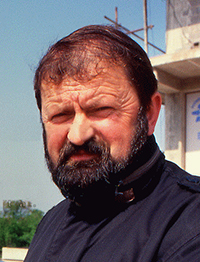Blaž Kraljević
| Blaž Nikola Kraljević | |
|---|---|
 |
|
| Birth name | Nikola Kraljević |
| Nickname(s) | Ero |
| Born |
16 September 1947 Lisice, Ljubuški, Yugoslavia |
| Died | 9 August 1992 (aged 44) Kruševo, Mostar, Republic of Bosnia and Herzegovina |
| Buried at | Varda, Kruševo, Mostar |
| Allegiance |
|
| Service/branch |
Croatian Defence Forces Army of the Republic of Bosnia and Herzegovina |
| Years of service | 1991–1992 |
| Rank | Major General |
| Commands held | Croatian Defence Forces |
| Battles/wars | Bosnian War |
| Awards | Order of Petar Zrinski and Fran Krsto Frankopan |
Blaž Nikola Kraljević (16 September 1947 – 9 August 1992) was a Bosnian Croat paramilitary leader who commanded the Croatian Defence Forces (HOS) during the Bosnian War. An immigrant to Australia, Kraljević joined the Croatian Revolutionary Brotherhood (HRB) upon his arrival there in 1967. During his return to Yugoslavia in January 1992 he was appointed by Dobroslav Paraga, leader of the Croatian Party of Rights (HSP), as leader of the HOS in Bosnia and Herzegovina.
During the Bosnian War he advocated a Croat–Bosniak alliance, a view that ran counter to those of the Croatian government led by Croatian president Franjo Tuđman and his Croatian Democratic Union (HDZ) party. He denounced attempts by Mate Boban, president of the self-proclaimed Croatian Republic of Herzeg-Bosnia, and Radovan Karadžić, president of the self-proclaimed Republika Srpska, to divide Bosnia and Herzegovina and was appointed by Bosnian president Alija Izetbegović as a member of Staff of the Army of the Republic of Bosnia and Herzegovina (ARBiH), shortly before his assassination by Croatian Defence Council (HVO) soldiers under the command of Mladen Naletilić.
Blaž Kraljević was born on 16 September 1947 in the village of Lisice in the municipality of Ljubuški, Bosnia and Herzegovina. In 1967, at the age of 19, he migrated to Australia where he was recruited by Srećko Rover into the Croatian Revolutionary Brotherhood (HRB), a pro-Ustaše group established in the mid-1950s. Kraljević remained in Australia until 1990 when he returned to Yugoslavia to help fight for Croatian independence.
...
Wikipedia
